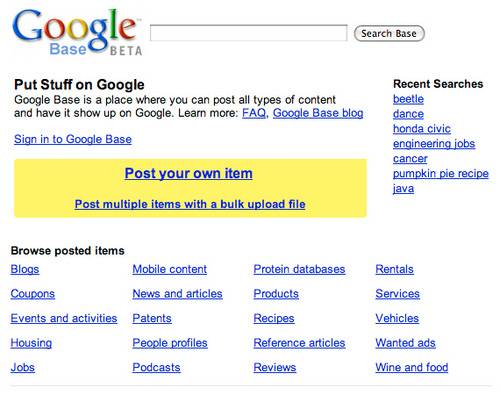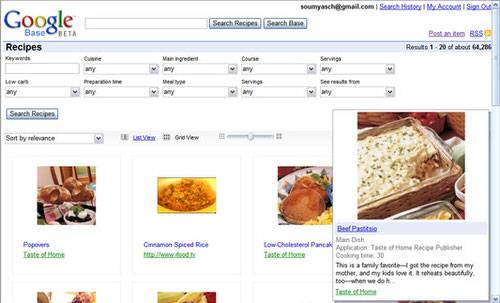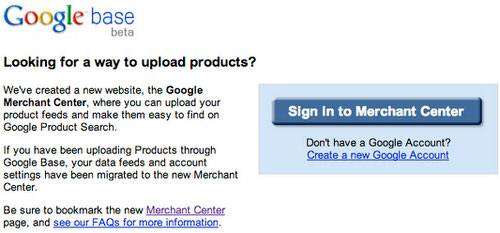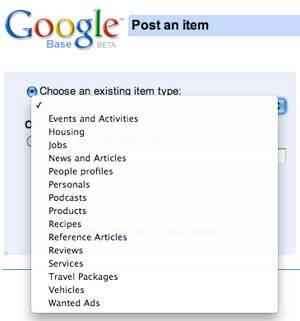The dream of creating a structured database of the world’s content has eluded Google’s grasp. But at least it got a bunch of useful retail data out of it.

The Web world is nothing if not Darwinian: it’s survival of the fittest and products need to evolve with the times. Some Web products fly and some don’t. Those that don’t fly either die out, or evolve into something new. The latter is what happened to Google Base, which in 2011 is a shadow of its former self – and is even about to lose its API. It did however spin off a more successful offering, in the form of the Google Merchant Center for retailers. In this post, we look back on the initial vision for Google Base and then analyze what it actually evolved into.
How Google Base Started Out in 2005
For those of you whose memories don’t go back as far as Web 2.0, Google Base is an online database that launched in November 2005. At that time it enabled you to upload any type of information, along with “attributes” that described it further. Early examples of Google Base content included reviews, events, products and jobs. Some – but far from all – of the data was then surfaced in Google properties like search, Froogle and Local.
A snapshot of Google Base homepage, circa January 2006 (source: Wayback Machine)

Despite a clunky user interface and initial mixed reviews, Google Base was a promising product in late 2005 and early 2006 because of its potential to better structure Web content. At the time Google appeared to be aiming to use the product to improve its main search engine, but also to create other Google properties in verticals like e-commerce and classified ads. So there was a lot of talk at the time about it challenging eBay and Craigslist.
This is how I summarized Google Base back in November 2005:
Google Base may not be pretty to look at and it may be a centralized database, but the potential is there to turn it into a hugely valuable directory of structured content. Plus if they add APIs and start aggregating outside RSS feeds, then they could easily extend Google Base and remove the issues around it being a ‘walled garden’.
In about April 2006, Google began to expand the number of vertical niches it covered in Google Base. The product was expanding, but how good was the data it was receiving and was there any sign of it being productively used?

Google Base in 2011 & its More Successful Spin-off
Fast forward five years to April 2011 and Google Base still exists (and incidentally still labeled a “beta” product!), but it’s been scaled back in two big ways.
Firstly, commercial product data has been separated out into a new Google property called Google Merchant Center, which launched in September 2009. Google Base is now restricted to “non-product data.” Data in the Merchant Center is being used in Google Commerce Search, the third generation of which was announced last week. As the name suggests, Google Commerce Search is a search engine for retail – a market which Google obviously sees huge potential in.

The other big difference between the 2011 Google Base and its 2005/2006 version: there’s no Web frontend for people to search the data. Whether Google ever even wanted to make Google Base into a long-term frontend product is debatable, although what’s not debatable is that it was a user interface mess from the start.
What Happened to the Structured Content Dream?
Looking at how Google Base evolved, one has to ask: was retail data the only valuable thing that came out of Google Base? Did the grand dream of all types of structured content never pan out?
The main problem with structured content has always been that you can’t rely on people to upload reliable data for a variety of reasons ranging from motivation to accuracy. As I wisecracked back in 2005, “Google could in fact be building the world’s largest database of structured shite.”

That’s not to say that structured content isn’t alive and well. But nowadays the main initiative around this is the W3C’s Linked Data, which is getting good uptake from governments and commercial companies alike.
Google is obviously still innovating with new types of data, structured and otherwise, but it no longer views Google Base as a good source of that data. Or at least, not good enough to actively foster – because it’s about to deprecate the Google Base API.
Google Base to Lose its API
In December last year, Google announced that it is deprecating the Google Base Data API and replacing it with two new APIs: the Content API for Shopping and the Search API for Shopping. The Google Base Data API will be “fully retired” on June 1, 2011.
What this means for Google Base is unclear, but it’s obvious that Google is far more interested in developing the shopping spin-off, Merchant Center. It appears to be giving up on actively developing its database for other types of structured content. In an FAQ about the API deprecation, Google stated:
“The new Shopping APIs won’t support use cases that require uploading & searching data for non-shopping applications like Real Estate, Events, Jobs, Activities and other custom structured content applications.”
While Google Base lives on, it’s a much diluted product. Retail data was clearly the only valuable user-generated content that Google got out of it. Let us know in the comments whether you’ve used Google Base, in the past or now. What are your thoughts on its evolution and future?
Photo credit: Wikipedia










